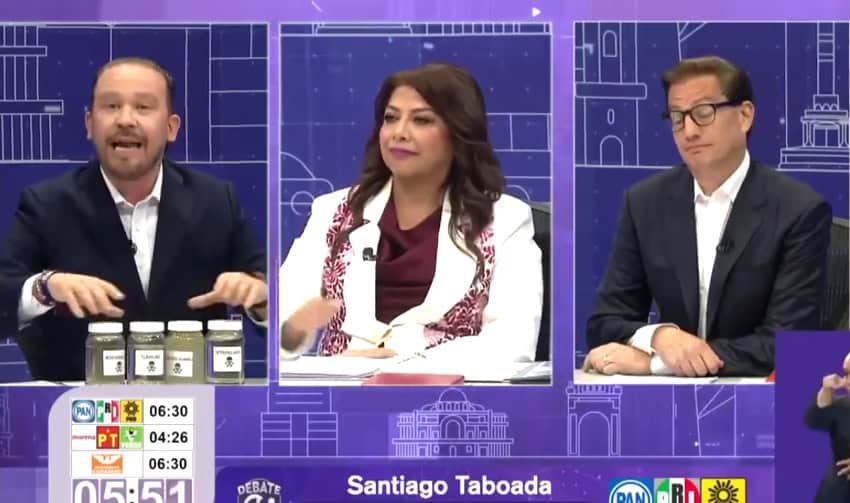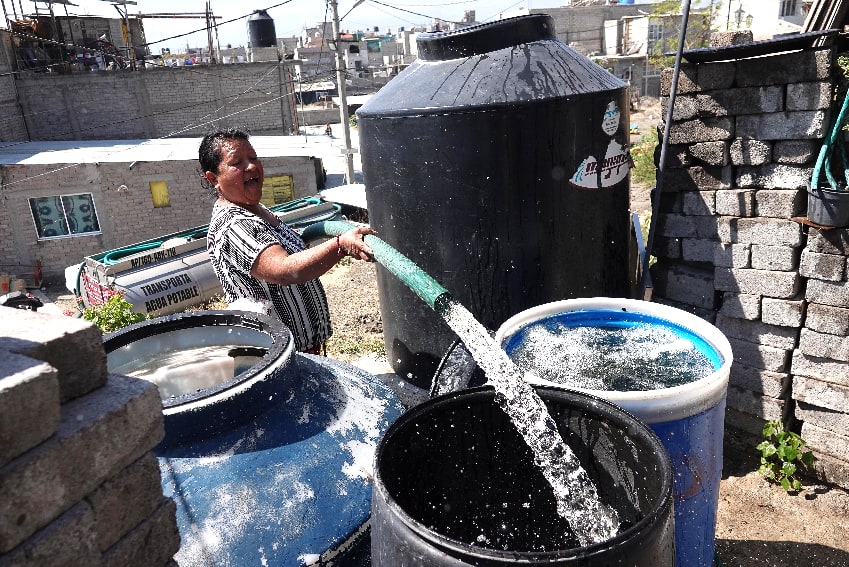The contest to become the next mayor of Mexico City is tightening, according to a recent poll that found that the gap between the two leading candidates is just five points.
Conducted earlier this month, the El Financiero newspaper’s latest poll found that Clara Brugada, candidate for a coalition led by the ruling Morena party, had 42% support among 800 respondents who are eligible to cast a vote in the June 2 mayoral election.
Santiago Taboada — who will represent an alliance made up of the National Action Party (PAN), the Institutional Revolutionary Party (PRI) and the Democratic Revolution Party (PRD) — attracted 37% support.
The gap between the two candidates declined three points compared to March, when El Financiero found that Brugada, former mayor of the Mexico City borough of Iztapalapa, had 44% support and Taboada, ex-mayor of the borough of Benito Juárez, had 36% support.
Support for the third candidate, Salomón Chertorivski of the minor Citizens Movement (MC) party, declined to 6% in April from 7% last month.
The remaining 15% of respondents said they hadn’t yet decided who they will vote for on the first Sunday in June, when Mexicans across the country will go to the polls to elect a new president and thousands of other federal, state and municipal representatives.

Excluding the presidency, the biggest single prize on offer in this year’s elections is considered by many to be the mayorship of Mexico City, the national capital and the country’s largest city. Claudia Sheinbaum, the Morena party’s presidential candidate, is aiming to use her 2018-23 tenure as mayor of Mexico City as a springboard to the nation’s top job.
Brugada more popular among women and the lower class, Taboada favored by men and the middle class
Almost half of female respondents to the latest El Financiero poll — 46% to be exact — said they intend to vote for Brugada, a 60-year-old economist who served as a federal and Mexico City lawmaker before becoming mayor of Iztapalapa, a sprawling densely-populated borough in the capital’s east.
One-third of the women polled said they plan to vote for Taboada, a 38-year-old law graduate who also served as a federal and Mexico City lawmaker before becoming mayor of Benito Júarez, a largely middle class borough south of the historic center.
Among men, support for the PAN-PRI-PRD candidate rose to 40%, while Brugada, who will also represent the Labor Party and the Green Party in the mayoral election, attracted support from 38% of male respondents.
El Financiero also found that 46% of respondents who identified as belonging to the lower class of society intend to vote for the Morena candidate. Founded by President Andrés Manuel López Obrador, Morena is particularly popular among Mexico’s most disadvantaged citizens, in part due to the welfare and social programs delivered by the current federal government.
About three in 10 “lower class” respondents — 31% — said they plan to vote for Taboada, who represented the conservative PAN as mayor of Benito Juárez.
Support for Brugada fell to 38% among respondents who identified as belonging to the middle class. Support for Taboada among that cohort was five points higher at 43%.
The PAN-PRI-PRD candidate was also more popular than Brugada among respondents aged 18-29 and those with a university education. The Morena candidate prevailed among respondents aged 30-49 and 50 and over, and among those whose highest level of education was primary school or high school.
Water and corruption the focus of the second mayoral debate
El Financiero’s poll was conducted before the second mayoral debate, which was held on Sunday night.
As was the case in the first presidential debate, the leading candidates took the opportunity to launch a number of personal attacks on their main rival.

But amidst the acrimony and allegations, Brugada, Taboada and Chertorivski did speak about some of the proposals they intend to implement should they succeed Martí Batres as mayor of Mexico City in late 2024.
Brugada
Among the proposals outlined by the Morena candidate were to build new water treatment plants and create a ministry dedicated to the sustainable management of water. As mayor, Brugada said she would guarantee the supply of high-quality water to all homes in the capital — no easy task in a city where the essential liquid is at a premium and many residents currently have limited or no access to running water.
She also said she would create and lead an “anti-corruption cabinet,” which would oversee the Mexico City government’s fight against corruption.
Taboada
The PAN-PRI-PRD candidate said that a government he leads would invest more in water projects than any previous Mexico City administration.
“First we’re going to repair the leaks that Morena was unable to repair in 27 years,” Taboada said, apparently ignoring the fact that Morena has only governed the capital since 2018 and was only registered as a political party in 2014.
After asserting that Mexico City loses 40% of its water due to pipe leaks, the candidate outlined his other planned water initiatives, including one to capture more rainwater.

As mayor of Benito Juárez, “I captured more than 24 million liters of water,” he said. “… We’re a generation of change,” he added, apparently seeking to emphasize that he is significantly younger than Brugada.
Among Taboada’s corruption-fighting proposals was one to allow corruption-related complaints to be filed digitally with the Mexico City Attorney General’s Office.
Chertorivski
The MC candidate pledged to invest 17 billion pesos (US $1 billion) in a “zero leak” initiative under which faulty water pipes would be repaired. Chertorivski — a former federal health minister — also promised to guarantee citizens’ right to water.
As mayor, he pledged to make all government contracts public and to hold competitive tendering processes before they are awarded. Competitive bidding for contracts will be the rule rather than the exception, Chertorivski said.
Expounding further on his proposed anti-corruption measures, he said that during his mayorship, Mexico City residents will be able to complete all government procedures online and therefore won’t need to go into government offices.
“No more contact with public servants so that they don’t even have the chance … to be corrupt,” Chertorivski said.
- Read more about the Mexico City mayoral candidates and their proposals in this recent MND article.
With reports from El Financiero and El Economista
